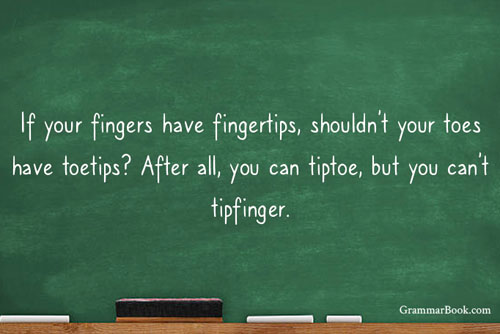|
Clear communication in writing depends on more than precise punctuation and word choice. It also relies on proper placement of modifiers. If related elements are not in proximity or the sentence does not otherwise make internal references clear, we will have a statement such as the following:
| To avoid an accident while driving at night, the headlights should always be on. |
You probably have the basic idea of what the sentence is aiming to say. You also may have hit or detected a mental road bump, even if it was slight.
Are the headlights looking to avoid an accident while driving at night? The sentence as written implies they are. It has what is referred to grammatically as a dangling infinitive.
What Is a Dangling Infinitive?
An infinitive is the base form of a verb before it is conjugated. It is formed with “to” plus the verb root: to write, to avoid, to walk, to study. It does not function as a verb; rather, it serves as a noun, an adverb, or an adjective in a sentence.
Examples
Jennifer wants to write well. (noun acting as a direct object)
Jennifer studies grammar to write well. (adverb describing why Jennifer studies)
Jennifer has a goal to study more grammar. (adjective modifying goal) |
In these sentences, it is clear what each infinitive phrase relates to. Now let's see what happens if we detach or distance the phrases from the elements they mean to modify:
To write well Jennifer wants. (or To write well, Jennifer wants.)
To write well, grammar is studied by Jennifer.
To study more grammar Jennifer has a goal. (or To study more grammar, Jennifer has a goal, which might pass scrutiny with the phrase modifying the subject, Jennifer; however, the connection is clearer when the phrase modifies the direct object, goal.) |
We can now see how the misplaced modifiers “dangle,” or hang loosely with no clear attachment. In our daily reading and writing, we will probably see this dangling most often with an infinitive phrase that begins a sentence as a modifying adverb:
To show them as viable, the tablets were dissolved in the solution.
To play that guitar solo, practice is necessary.
To operate correctly, the plug must be in the outlet. |
Here again, as at the start of our discussion, we might be able to interpret what each sentence is looking to say, but precise and eloquent writers will not invite such interpretation and potential ambiguity.
In the first sentence, the tablets are the modified subject performing the act of showing. In the second, the practice will play the guitar solo. In the third sentence, the plug is the agent for which correct operation is intended, when what we really mean to modify is the mechanism to which the plug is attached.
Let's fix those sentences so the infinitives no longer dangle:
To show them as viable, the presenter dissolved the tablets in the solution.
To play that guitar solo, one needs to practice.
To operate correctly, the paper shredder must be plugged in the outlet. |
The relationship between each infinitive phrase and its modified agent is now more clear. Also note how close the phrase and the agent are in the sentence. The nearer a modifier is to its modified element, the more evident their relation will be.
Dangling Infinitives: Active vs. Passive Voice
You will find that infinitive phrases can often dangle when they are included with a sentence in the passive voice:
To write well, grammar is studied by Jennifer.
To show them as viable, the tablets were dissolved in the solution. |
The reason is that in the passive voice, the subject receives rather than performs the action, making the subject-verb relationship less direct. Verb modifiers can become aimless in these constructions, as in our examples right above.
The solution is to use the active voice whenever possible. Revising the examples in the active voice gives us:
To write well, Jennifer studies grammar.
To show them as viable, the presenter dissolved the tablets in the solution. |
These revisions show how we will be most efficient with our writing when we keep the modifying infinitive phrase directly connected to the action's agent (the subject) in the main clause.
Dangling Infinitives: An Exception
There are times when a modifying infinitive phrase might appear to dangle but does not. These occur when the phrase modifies the entire sentence, as it does in statements of general truth, comment, or observation:
To be honest, that jacket looks two sizes too big.
To put it mildly, parking that old car out front is lowering our property value.
To be brief, let's not go. |
Most of us have come across these types of expressions. In each example, the infinitive phrase applies to all that follows as opposed to a particular element (e.g., the subject).
In our mission to be accurate communicators, we will best serve our writing by attending to it as a focused reader would. Simply be aware of logic and clarity in connecting infinitive phrases to other grammatical elements, and you will find they do not dangle.
Related Topics
What Are Dangling Modifiers?
Dangling Phrases and Clauses
|





